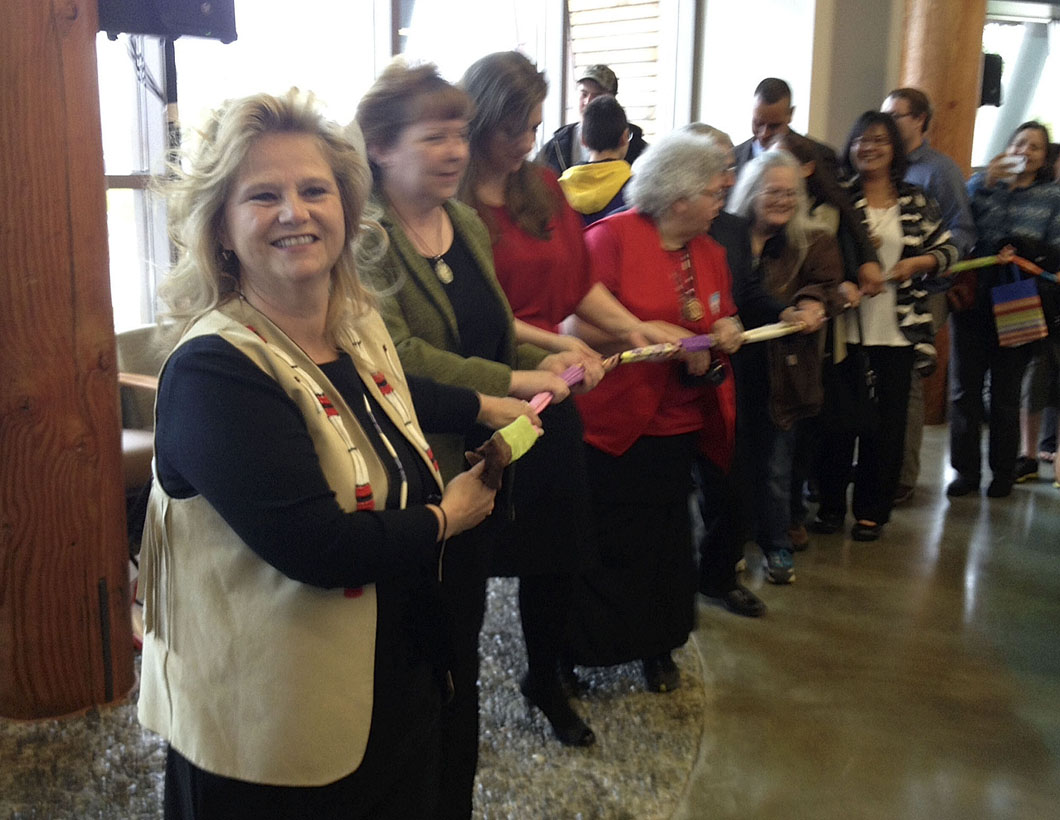Isis Fischer wanted to dance.
She squatted, stamped her feet and arched her back, and stared at Rolly Rivas, whose bell-wrapped feet matched the rhythm of the Mount Susitna drummers and singers gathered around a skin drum in the large gathering space of the Dena’ina Wellness Center.
Rivas spun around, a whirl of feathers and brightly colored beads, looked right at Isis, stretched his hand toward her and beckoned her to cross the glacial-blue polished concrete floor of the new building in Old Town Kenai.
It was all the encouragement she needed and grinning wildly, the 6-year-old took off, running, jumping, dancing her way to a spot behind Rivas where she ducked under his elaborate feathered costume and matched her steps to his.
It was a common sight during the three-day celebration, children being welcomed into the ceremony and encouraged to play among the adults.
Hundreds of people gathered at the wellness center for the first two days, taking self-guided tours of the state-of-the-art facility, listening to a parade of speakers and well-wishers, listening to drum and chanting circles and sharing meals — all celebrating the grand opening of the center.
The center integrates the Kenaitze Indian Tribe’s primary care, dental, behavioral health and wellness services into one 52,000-square-foot, two-story building. The center serves Alaska Native and American Indian people. Programs that receive state funding, including behavioral health, are open to the central Kenai Peninsula community.
The center is one of three projects nationwide to receive the highly competitive Indian Health Service Joint Venture Award in FY2011. IHS Joint Venture funding supports operation and maintenance for a minimum of 20 years. The building was designed and constructed by the tribe in consultation with elders, employees and customers. It was completed on time and under budget.
Major funders include the state of Alaska, Cook Inlet Region Inc., the M. J. Murdock Charitable Trust, the Rasmuson Foundation and The Alaska Mental Health Trust, according to a press release.
More than 375 people signed a guest book for the tribe on Thursday, the first evening of the celebration. Each was given a jar of salmon and a commemorative trinket honoring the Kenaitze Indian Tribe.
For more than three hours, a parade of speakers congratulated the tribe on its achievement and a Dena’ina cloth ceremony took place. Guests were invited to gather in a large circle and tear the same piece of cloth apart — each taking home a tangible piece of the opening ceremony.
Then, Friday, the music and dancing began in earnest as visitors gathered for a ceremony celebrating the art installed on the building site. A steady stream of people photographed Joel Isaak’s bronze statues depicting gathering and processing fish.
“It’s a family,” Isaak said, as he spoke to the audience Friday. “I wanted to convey that sense of family with the installation.”
As he spoke, Isaak, of Soldotna, told everyone in the crowd to turn to a neighbor and talk about their first memories of catching fish.
“Everybody I know has a fish story,” he said. “Fish bring people together.”
Isaak’s intricately shaped 6-foot, 1-inch Dena’ina fisherman is flanked by the massive wooden fish-rack shaped structure on the outside of the wellness center. Nearby on another mound, a woman climbs a bronze fish-rack, and a child stands by watching.
The site of the wellness center is important to the Kenaitze as it is one of the original village sites for the Kahtnuht’ana Dena’ina people.
As they celebrated their community and its achievement with the center, the tribe moved to its educational fishery site Saturday for a potluck at the mouth of the Kenai River looking out into Cook Inlet.
Campfire smoke drifted over those in line for the potluck dinner of beans, salmon and barbecue. Picnic tables bursting with community members encircled the constantly lit campfire.
Alexandra “Sasha” Lindgren, director of tribal government affairs, sat and talked with guests. She said she had not expected such a turnout.
Meanwhile, children dug deep holes on the beach, and rushed back and forth between the rising tide to fill buckets for their sand structrues.
As Clinton Lageson stood up and left his spot at one of the drums, his sister Alexis Lageson quickly filled in.
Beaded necklaces with engraved wooden pendants and jars of canned fish were given to the elders, and the ceremonies helped bless the new center.
Everyone in the Kenaitze community really pulled together in the last three days, Clinton Lageson said.
After hours of eating, chatting and digging in the sand, a group of children and adults pulled the tribe’s setnet from the water, and harvested the catch.
Rashah McChesney is a reporter for the Peninsula Clarion. Clarion reporter Kelly Sullivan also contributed to this report.


